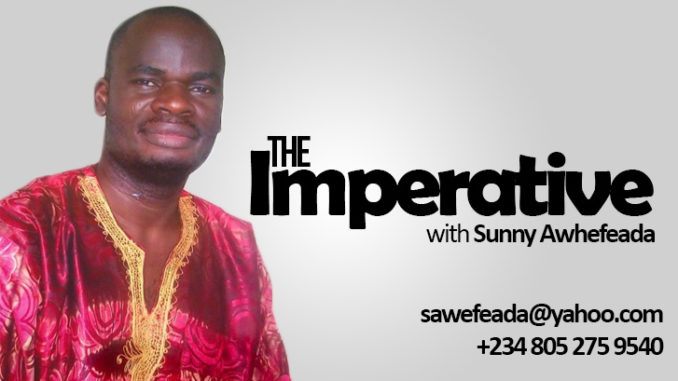
Every field of human endeavour has its attraction as well as icons that rookies not only look up to, but are touchstones of accomplishment. While growing up in edenic Evwreni in the 1980s, newspapers and the Nigeria Television Authority (NTA) connected us to the world. The world was Ughelli, Benin-City and beyond. Evwreni was tucked away among tall trees and giant grass. There were two Evwrenis. The Evwreni of the Teachers’ Training College where some of us lived and the Evwreni inhabited by the indigenes. It was the former that was truly connected to the world. Evwreni had no electricity when I arrived there in July 1981 to continue with primary education. Then, one day, the roaring sound of a giant electricity generator ruptured the serenity of our evening. And in no time the entire college premises was illuminated. The College began to enjoy electricity from 7pm to 10pm daily. That routine ran from late 1983 to around 1987 when the Structural Adjustment Programme (SAP) truncated the capacity of the College to maintain and fuel the generator.
My Evwreni years were symbolic because those were my earliest years of learning to come to terms with Nigeria and her vagaries. College teachers in those days numbered among the elite and they could afford daily newspapers; The Daily Times, Nigerian Observer, New Nigerian, Sketch, Tribune, Punch, Vanguard, The Guardian, were among the papers that passed from one hand to another in the College quarters. The NTA was then the major television station in the country and its national network news which ran from 9pm to 9.30pm was compulsory for Nigerians who had television sets. The news was informative, educative and entertaining. So was what the newspapers also published. It was thus from the newspapers and television that I had my earliest immersion into what Nigeria was all about.
The news which was, and still is, our national narrative was peopled by personages who were either heroes or villains. It was the era of military dictatorship and the leaders we knew were soldiers. We admired them and dreamt of going to the Nigerian Defence Academy, become epaulette wearing soldiers and shoot our way into power. We innocently admired Buhari, Idiagbon, Babangida and Abacha! The lawyers also held a great attraction for us. F. R. A. Williams, Bola Ajibola Gani Fawenhimi, Alao Aka Bashorun, were our idols. For journalism, Dele Giwa (his death brought him into our consciousness), Ray Ekpu, Dan Agbese, Dare Babarinsa were our favourites. Literature threw up inimitable Chinua Achebe, J. P. Clark, Wole Soyinka, Ola Rotimi, Zulu Sofola and Flora Nwapa.
Our encounters with literature were limited to the writers whom we adored. As teenagers, we had no idea that there was an order of rigorous men and women called literary critics who interpreted the novels, plays and poems we read. Yes, I did encounter some of the critics in newspapers and magazines, but I could neither define their calling nor give them an identity. It was when I took literature courses at the University of Benin that my lecturers unveiled to us the second order giving interpretation, meaning and direction to literary engagements. Abiola Irele, Oyin Ogunba, Donatus Nwoga, Dan Izevbaye, Romanus Egudu, Steve Ogude, Charles Nnolim, Omafume Onoge Biodun Jeyifo, G. G. Darah, Sam Asein, Molara Ogundipe-Leslie, F. Okeke-Ezigbo, among others too numerous to mention leapt out of the cold prints of textbooks and journals and became our unseen critical companions. Called literary critics or scholar-critics we chewed on their submissions and imbibed them unquestionably. We frequented the library and pored over journals like Presence Africaine, Research in African Literatures, African Literature Today. It was a new world where we learnt to read and interrogate texts. It was for me a preparation for today.
Professor Biodun Jeyifo for whom this tribute is meant remained distinctive in the stellar constellation of the critics earlier referred to. Our then very young lecturer, Toyin Adepoju, mentioned Jeyifo at every opportunity and I became curious about him. I got more fascinated when Adepoju mentioned Jeyifo’s book, The Truthful Lie: The Sociology of African Drama. I rummaged the library looking for it without luck. However, things soon began to fall in place. I read Jeyifo’s essay on the poetry of Niyi Oundare in The Guardian Literary Series and the simple, but illuminating brilliance of it charmed me. My communion with Jeyifo and Osundare had begun.
I have since, like many other academic devotees, followed Jeyifo’s effulgent trajectory. Besides, reading his avant-garde critical interventions my impressions of him were formed from inspiring narratives by Osundare, Darah and Onoge in addition to Adepoju’s earlier broaching. Jeyifo, profound, meditative, rigorous and unpretentious, is an incurable Marxist and radical humanist. He is, probably, Nigeria’s, nay, Africa’s most important literary critic. His interventions in theory, culture and literature have continued to push forward the frontiers of scholarship. As a teacher, scholar, newspaper columnist, activist and more, Jeyifo remains a towering inspiration. This played out when he spent two days with us at Effurun during the rites of passage of Onoge in 2009. That the Obafemi Awolowo University (OAU) Ile-Ife, one of Nigeria’s most prestigious universities and Jeyifo’s former place of work chose to honour him with an honourary doctorate in literature is most salutary for academe.
The newspaper pictures of the event had Niyi Osundare, Femi Osofisan, Odia Ofeimun, Kunle Ajibade, Ogaga Ifowodo and other leftist scholars in attendance. It was a reunion of comrades. The occasion must have provided Jeyifo, Osundare, Osofisan and Ofeimun an opportunity to reminisce on the past and evaluate what happened to their dreams of an egalitarian Nigeria. They must have thought of what happened to the Left. They must have thought of what happened to the culture of robust polemics in our universities and why many among us have become silent, timid and unconvincing Marxists.
END

Be the first to comment